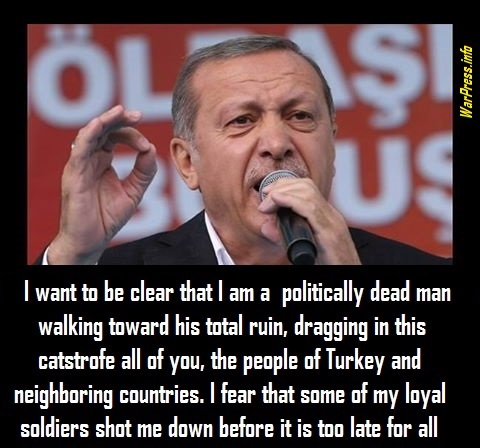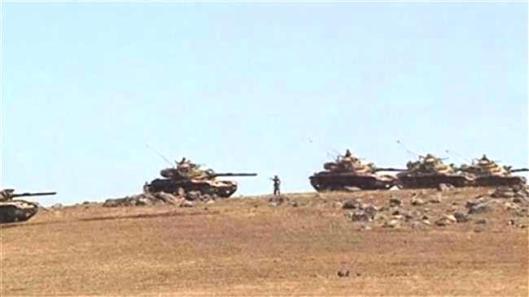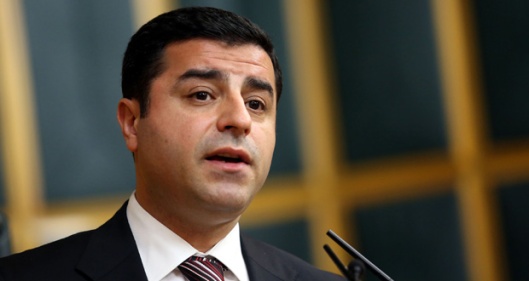Erdogan’s Syria policy aimed at deceiving Turks:
Adivsor to former Syrian President Hafez al-Assad
(PressTV) ~ Ankara’s potential military intervention in Syria will be nothing but a “silly political trick” by Turkish President Recep Tayyip Erdogan, who is trying to act strong after he suffered a defeat in parliamentary elections, a former Syrian official tells Press TV.
In an exclusive interview with Press TV, George Jabbour, an adivsor to former Syrian President Hafez al-Assad, reacted to reports of Ankara’s plans for the deployment of army forces to the border with Syria, saying the idea of intervening in Syria was devised by Erdogan to “deceive” the Turkish people that he is still powerful.
“Erdogan would like to say that he continues to feel strong although he was … almost defeated in the elections,” George Jabbour said.
Erdogan’s plan for a possible military intervention in neighboring Syria is “just to show the Turkish people that he is still strong and able to pursue his policies. But, I think that these policies are not supported by the Turkish government. It is a silly political trick,” Jabbour said.
Last month, general elections were held in Turkey, with Erdogan’s ruling Justice and Development Party (AKP) failing to obtain an absolute majority in parliament for the first time since coming to power in 2002.
On June 28, reports by Turkish media suggested that the Turkish government has ordered the army to deploy forces to the border areas in a bid to prevent significant gains by Kurdish forces fighting against the ISIL terrorists there.
The reports came two days after the Turkish president accused Syrian Kurds of trying to establish a state in the crisis-hit country’s north, saying Ankara will leave no stone unturned to prevent such an establishment near its borders.
Elsewhere in his remarks, the analyst further emphasized that any potential military intervention in Syria would be in violation of international law as such a move needs to be approved by the United Nations Security Council (UNSC).
Touching on latest reports suggesting that the Turkish military is deploying tanks to the common border with Syria to create a “military buffer zone” there, the analyst added, “There is no possibility of establishing a buffer zone in Syria, this is totally illusive, there would be no buffer zone in Syria.”
The planned buffer zone reportedly stretches 110 kilometers (68 miles) long and 28 kilometers (17 miles) wide between the southern Turkish towns of Karkamis and Oncupinar.
The Syrian crisis, which broke out in March 2011, has left more than 230,000 people dead and millions displaced.
Turkey, an outspoken critic of the Syrian government, has time and again been accused of supporting the militants fighting against the Damascus government.
The Turkish Military Rejects Erdogan’s War Plans.
“False Flag” Needed?
(MoonOfAlabama)
~ The war on Syria would not be possible without the huge involvement
of Turkey on the side of the islamists fighting the Syrian government.
Despite some success by Kurdish guerrillas along the border with Turkey
against the Islamic State there are still open routes that allow the
islamists to cross and which are their most important supply lines.The Kurdish success against the Islamic State and other Turkey supported islamist groups, created with U.S. air support, is seen as a strategic threat to Turkey. The Kurds already have a semi-autonomous state in north Iraq. They now could possibly create one in Syria along the Syrian Turkish border. They may later want to integrate Kurdish areas in Turkey.
“I am addressing the whole world: We will never allow a state to be formed in northern Syria, south of our border,” Erdoğan said at a Ramadan event organized by Turkish Red Crescent in Istanbul late June 26.
“We will keep up with our struggle whatever the cost is. They are trying to complete an operation to change the demographics of the region. We will not condone,” he said.
The economic situation in Turkey is getting worse. Erdogan and his AKP party lost in the recent elections but want to avoid a coalition government. Erdogan isn’t finished. He will call for new elections but will first create a situation that will diminish the vote for the mostly pro-Kurdish party HDP and thereby recoup their parliamentary votes for his AKP.
All three issues: the Turkish proxy attack on Syria through islamists forces, countering the threat of Kurdish consolidation in Syria and diminishing support for the pro-Kurdish party in Turkey could possibly be furthered in Erdogan’s favor if he could create a wider conflict with the Kurds.
Last weeks Islamic State raid on Kobane, allegedly from Turkey, killed over 200 people, mostly civilians. This was a much bigger terrorist attack than the ones in Tunisia, Kuwait and France which were hyped in “western” media. But with U.S. support on the side of the Kurds the islamist Turkish proxy forces have trouble to defeat the Kurds.
Erdogan’s solution to his problems is to send the Turkish military. Its task would be to keep the Kurds in Syria from progressing further and to keep the logistic lines for the Islamic State to Turkey open. The army fighting against Kurds in Syria could also help to diminish non-Kurdish support for the pro-Kurdish HDP in Turkey.
But the Turkish army does not want to fight Erdogan’s war:
Turkey’s government wants more active military action to support the Free Syrian Army (FSA) against the regime, Kurdish and jihadist forces in Syrian territory, but the military is reluctant to do so, playing for time as the country heads for a new coalition government, official sources told the Hürriyet Daily News.
…
One source explained the “need” as to “prevent more clashes between the ISIL and the Kurdish forces led by the Democratic Union Party (PYD), prevent the PYD from taking full control over the Turkish-Syrian border and create a safe zone against a new wave of refugees on Syrian territory, no longer in Turkey.”
Chief of General Staff Gen. Necdet Özel has delayed the government directive with justifications of international law and politics and the uncertainty of reactions from the Bashar al-Assad regime in Syria, as well as from its supporters Russia and Iran, together with the United States.
The government has been conducting dialogue since then to convince the army on its plans.
The army is blocking Erdogan’s move to send at least one division into Syria. It wants its orders in writing and from a new, yet to be formed, government. The Turkish attack will therefore – should happen at all – not be launched before fall.
With this move the army leadership, surely in contact with the U.S., takes one of three of Erdogan’s reasons for sending the military off the table:
Twitter whistleblower Fuat Avni wrote in the early hours of Saturday that President Erdoğan is concerned about what the anonymous account alleged to be secret coalition efforts between the ruling Justice and Development Party (AK Party) and the main opposition Republican People’s Party (CHP) and that a Syrian war appears to be the only way to create chaos that will lead to increased support for the AK Party.
As the army does not want to follow Erdogan’s plan he may to have look for other ways to create an emergency situation. Could some “terrorist attacks” on Turkish land from Syria be used to press the army into immediate action? The Turkish intelligence service M.I.T. is in Erdogan’s hand. It does not shy away from dirty “false flag” business. Could it be used to create the crisis Erdogan needs? Could the neoliberalcons in Washington DC help him?
In statements to reporters on Tuesday, Demirtas stressed that the HDP vehemently rejects any aggression on Syria as the Turkish people refuse such acts, adding that Turkey should put an end to the state of schizophrenia and realize that the ISIS is the genuine threat in the region.
A number of political parties and figures accused Erdogan of seeking to wage a military attack on Syria with the aim of preventing the establishment of a coalition government, while media sources reported disputes between Erdogan’s regime and the Turkish army’s command regarding such a step.
It should be noted that U.S. State Department Spokesman John Kirby said recently that the U.S. sees no need for establishing a “buffer zone” in Syria, as Turkish officials have been demanding for months.
Erodgan’s regime failed to achieve an absolute majority in the most recent elections, with his party, the Justice and Development Party (AKP), getting 40.81% of votes, while the Republican People’s Party (CHP) received 23% of the vote. The Nationalist Movement Party (MHP) received 16.34%, and the HDP got 13.5%.
With Erdogan’s Regime permission, Daesh-ISIS lays mines on Syrian-Turkish borders
(SANA) ~ DAESH, the Islamic State in Iraq and Syria “ISIS” terrorists laid mines on the border line between Syria and Turkey near Karkamis city in the province of Gaziantep, Turkish Milliyet newspaper said.The paper added that members of ISIS terrorist organization laid mines in certain areas on the border at the sight of the Turkish soldiers, asserting that they also surrounded the houses locating on the border with trenches.
On Sunday, Turkish Yurt newspaper unveiled that residence permits granted by Erdogan’s regime to members of ISIS, who have infiltrated into Ain al-Arab city and perpetuated savage crime against civilians, were seized.
Erdogan’s Regime, which is still involved in shedding the Syrian blood, continues offering all kind of support to terrorist organizations in Syria through building training camps, arming and facilitating their movements into Syria to commit crimes against the Syrian people and recently offered them logistic assistance to attack Idleb city.
~
SOURCES: PressTV MoonOfAlabama SANA SANA Submitted by SyrianPatriots The real SyrianFreePress.NETwork at: https://syrianfreepress.wordpress.com/2015/07/05/erdogan-dead-man/



















No comments:
Post a Comment